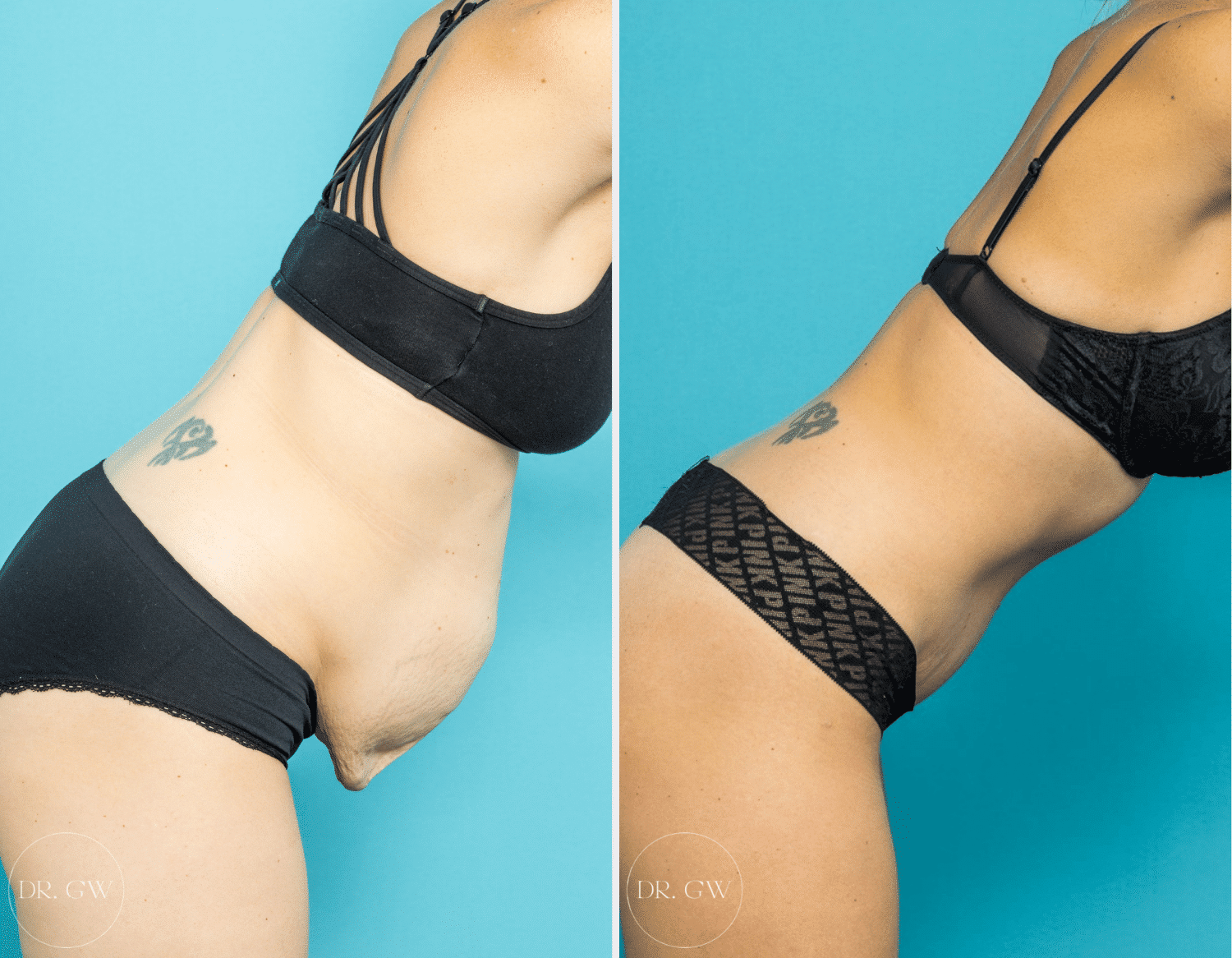
02 Aug BMI Impact on Abdominoplasty Results
Role of BMI in Determining Healthy Weight for Abdominoplasty
Tummy Tuck/Abdominoplasty surgery is an option for individuals seeking to remove excess skin on their abdomen. The procedure involves the removal of excess skin and fat from the abdominal area, as well as the tightening of the abdominal muscles. However, achieving optimal results is not solely dependent on the skill of the surgeon. Your overall health and, more specifically, your body mass index (BMI) play a crucial role in determining the success of the surgery.
Before undergoing a Tummy Tuck/Abdominoplasty procedure, it is important to understand the potential risks and complications that can arise, as well as the role your BMI plays in achieving optimal results.
Take our quiz, and find out if you are ready for surgery
In this blog, we will discuss the importance of BMI in Tummy Tuck/Abdominoplasty surgery, how to determine the ideal BMI for optimal results, and the steps you can take to maintain a stable weight post-surgery.
Perth Specialist Plastic Surgeon Dr. Guy Watts has garnered a reputation for his work in body contouring procedures. His extensive experience and surgical techniques have attracted patients from Perth and beyond, who seek to alter their abdominal contour.
Understanding BMI and Its Importance in Abdominoplasty Surgery
BMI is a numerical value derived from an individual’s height and weight, which is used to determine whether a person is underweight, normal weight, overweight, or obese. The formula for calculating BMI is as follows:
BMI = weight (kg) / height (m^2)
In Tummy Tuck/Abdominoplasty surgery, BMI is an important factor to consider because it can significantly affect the outcome of the procedure. Patients with a high BMI, typically classified as overweight or obese, may have a higher risk of complications during and after surgery, including infections, wound healing issues, and blood clots. Additionally, a high BMI can also contribute to suboptimal results, as excess fat in the abdominal area may limit the surgeon’s ability to achieve the patients desired results.
How BMI Affects Abdominoplasty Results
The impact of BMI on Tummy Tuck/Abdominoplasty results can be seen in several ways. First and foremost, a high BMI can make it more difficult for the surgeon to achieve the patients’ aesthetic goals, as there may be a greater amount of fat present that cannot be easily removed. This can result in a less-than-ideal aesthetic outcome, with the possibility of residual excess skin or a lack of abdominal muscle definition.
Secondly, individuals with a high BMI are more likely to have an increased risk of surgical complications, such as infections, wound healing problems, and blood clots. These complications can not only jeopardise the safety of the patient but also negatively affect the final results. Wound healing issues, for example, can lead to noticeable scarring or asymmetry in the abdominal area.
DOWNLOAD DR WATTS’ GUIDE TO ABDOMINOPLASTY

Determining a Suitable BMI for Optimal Tummy Tuck/Abdominoplasty Results
While there is no universally accepted BMI for Abdominoplasty surgery, most surgeons agree that a BMI of 30 or below is preferable for achieving optimal results. This is because individuals within this BMI range typically have a lower risk of surgical complications and are more likely to achieve their desired appearance following the procedure.
However, it’s important to note that the suitable BMI for Abdominoplasty surgery can vary from person to person, depending on factors such as their overall health condition, lifestyle, and individual surgical goals. It’s essential to consult with a qualified and experienced plastic surgeon to discuss your specific situation and determine the most appropriate BMI for your Abdominoplasty procedure.
The Relationship between BMI and Surgical Complications
As previously mentioned, a high BMI can increase the risk of complications during and after Abdominoplasty surgery. This is due to several factors, including:
- Increased risk of infection: Individuals with a high BMI may have a greater risk of developing infections following surgery, as the presence of excess fat can make it more difficult for the body to fight off bacteria and other harmful pathogens.
- Delayed wound healing: Excess fat can impede blood flow to the surgical area, resulting in delayed wound healing and an increased risk of complications such as wound separation (dehiscence) or necrosis.
- Increased risk of blood clots: Obesity has been linked to an increased risk of blood clots, which can be life-threatening if they travel to the lungs or other vital organs.
Preparing For Tummy Tuck/Abdominoplasty Surgery: Achieving a Healthy BMI
If you are considering Abdominoplasty surgery and your BMI is above 30, it’s essential to take steps to achieve a healthier weight before undergoing the procedure. This can not only help to reduce the risk of complications during and after surgery but also affect the overall aesthetic outcome of the procedure. Some strategies for achieving a healthier BMI include:
- Adopting a balanced, nutritious diet
Focus on consuming lean proteins, whole grains, fruits, vegetables, and healthy fats, while avoiding excessive amounts of added sugars, saturated fats, and processed foods.
- Engaging in regular physical activity
Aim for at least 150 minutes of moderate-intensity aerobic exercise per week, along with strength training exercises for all major muscle groups at least two days per week.
- Consulting with a healthcare professional
Seek guidance from a physician, registered dietitian, or another healthcare professional to organise a personalised weight loss plan tailored to your needs and goals.
Maintaining A Healthy Weight Post-Tummy Tuck/Abdominoplasty Surgery
Achieving and maintaining a healthy weight following surgery is crucial for long-lasting results. Weight fluctuations can cause the skin to stretch and the abdominal muscles to weaken, potentially compromising the outcome of the procedure. To maintain a healthy weight post-Abdominoplasty surgery, consider the following:
- Continuing to follow a nutritious, balanced diet
Focus on consuming nutrient-dense foods that support overall health and weight management.
- Staying active
Engage in regular physical activity, including both aerobic exercises and strength training, to maintain muscle tone and support a healthy weight.
- Monitoring your weight
Regularly track your weight to identify any fluctuations and address them promptly.
BMI Considerations for Revisions and Secondary Tummy Tuck/Abdominoplasty Surgeries
In some cases, patients may require secondary/revision surgery to address complications or dissatisfaction with the initial procedure’s results. BMI considerations for these types of surgeries are similar to those for primary Abdominoplasty procedures. It’s important for patients to achieve and maintain a healthy BMI before undergoing revision or secondary surgery to reduce the risk of complications and achieve the optimal outcome.
Achieving optimal results is highly dependent on maintaining a healthy BMI both before and after the procedure. A high BMI can not only increase the risk of complications during and after surgery but also negatively impact the overall aesthetic outcome of the procedure. By focusing on achieving and maintaining a healthy weight, you can help make sure you achieve optimal results from your procedure.
FAQs about Tummy Tuck/Abdominoplasty and BMI
What is the maximum BMI for Tummy Tuck/Abdominoplasty?
- The maximum BMI for a Tummy Tuck/Abdominoplasty generally varies depending on the surgeon’s preferences and patient’s health condition; however, most surgeons recommend a BMI of 30 or below to be a suitable candidate.
- This is because a lower BMI typically results in fewer complications and better surgical outcomes.
Can you get a Tummy Tuck/Abdominoplasty with a high BMI?
- Although it is possible to get a Tummy Tuck/Abdominoplasty with a high BMI, it is important to note that increased risks and complications may arise.
- Surgeons may require patients with a higher BMI to lose weight before surgery to reduce these risks and achieve optimal surgical results.
What is the right weight for Tummy Tuck/Abdominoplasty?
- The right weight for Abdominoplasty surgery varies from person to person, as it is highly dependent on an individual’s unique body composition and goals. Generally, patients should be at a stable and healthy weight that they can maintain post-surgery to achieve desired long-term results.
Can I get a Tummy Tuck/Abdominoplasty if my BMI is 35?
- If your BMI is 35, some surgeons may still consider you for a surgery; however, they will likely emphasise the importance of losing weight prior to surgery.
- This helps reduce potential complications and can help achieve a more aesthetically pleasing outcome.
Will I look thinner after Tummy Tuck/Abdominoplasty?
- Although Abdominoplasty is not a weight loss procedure, most patients will appear thinner after surgery, as the procedure removes excess skin and fat while tightening the underlying abdominal muscles.
- It is crucial to maintain a healthy lifestyle and stable weight to preserve the long-term results of the surgery.
Further Reading about Body Contouring Procedures with Dr. Guy Watts
- Read Dr. Guy Watts’ Tummy tuck/ abdominoplasty Surgery Page
- Read Dr. Guy Watts’ Liposuction Page
- Read Dr. Guy Watts’ Post Pregnancy Surgery Page
- See Dr. Guy Watts’ Abdominoplasty Photo Gallery Page
- Read Dr Watts’ How Do I Get a Flat Stomach or Flatter Abdomen
Medical References about Tummy tuck/ abdominoplasty and BMI
About Dr. Guy Watts – MED0001539378
FRACS (Plas) – Specialist Plastic Surgeon In Perth WA
Dr. Guy Watts is a Specialist Plastic Surgeon (AHPRA MED0001539378) with an extensive career that spans across renowned plastic surgery clinics worldwide. His experience has been honed through invaluable experiences at esteemed establishments such as the New York Eye and Ear Infirmary and the renowned Pitanguy Clinic in Brazil.
Having collaborated with the foremost cosmetic plastic surgeons on a global scale, Dr. Watts has chosen to return to Perth after a 17-year journey of intensive training and invaluable professional experience to bring the latest practices and technology in cosmetic plastic surgery to his patients.
Dr. Watts is a Fellow of the Royal Australasian College of Surgeons (FRACS) and a Member of the Australian Society of Plastic Surgeons (ASPS), Australasian Society of Aesthetic Plastic Surgeons (ASAPS) and the International Society of Aesthetic Plastic Surgeons (ISAPS).
Read about the potential Risks and Complications of Surgery
Read the Patient Information and Resources
About CLINISPA
Clinispa is Dr Watts’ bespoke medical clinic performing Cosmetic Aesthetic treatments. At Clinispa, we offer advanced clinical treatments in a luxurious and calming environment, tailored to support your skin’s health and appearance.
Clinispa aesthetic services are performed by Dr Guy Watts’ nursing professionals, who have a passion for and solid understanding of facial aesthetics.
All Clinispa clients are considered individually, with a personalised treatment plan consisting of advanced scientific approaches to cosmetic aesthetics. We incorporate innovative technologies in conjunction with superiorly formulated skin care.
For more information about the full range of Clinispa Aesthetic of Cosmetic Treatments visit the Clinispa website








Sorry, the comment form is closed at this time.